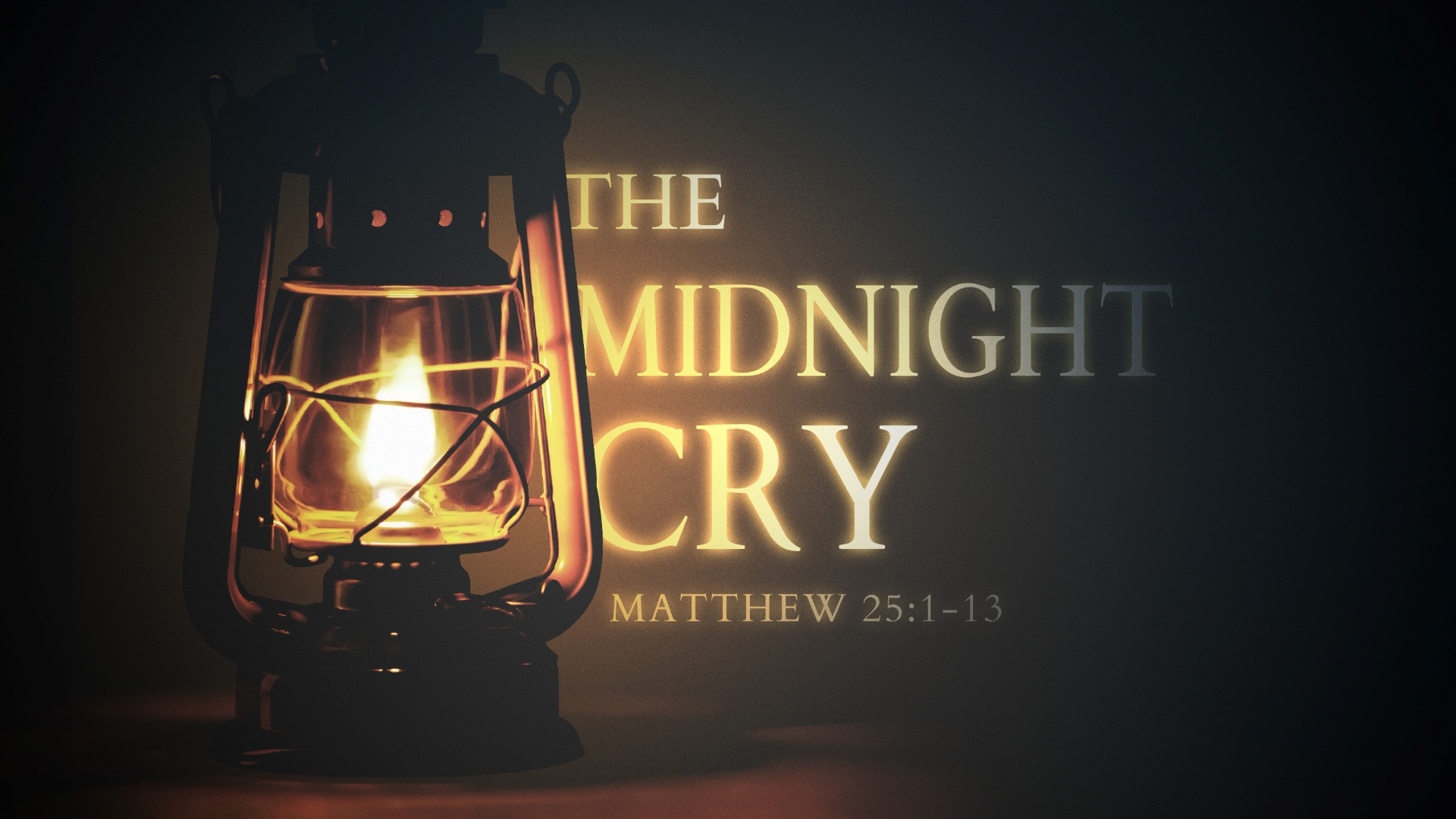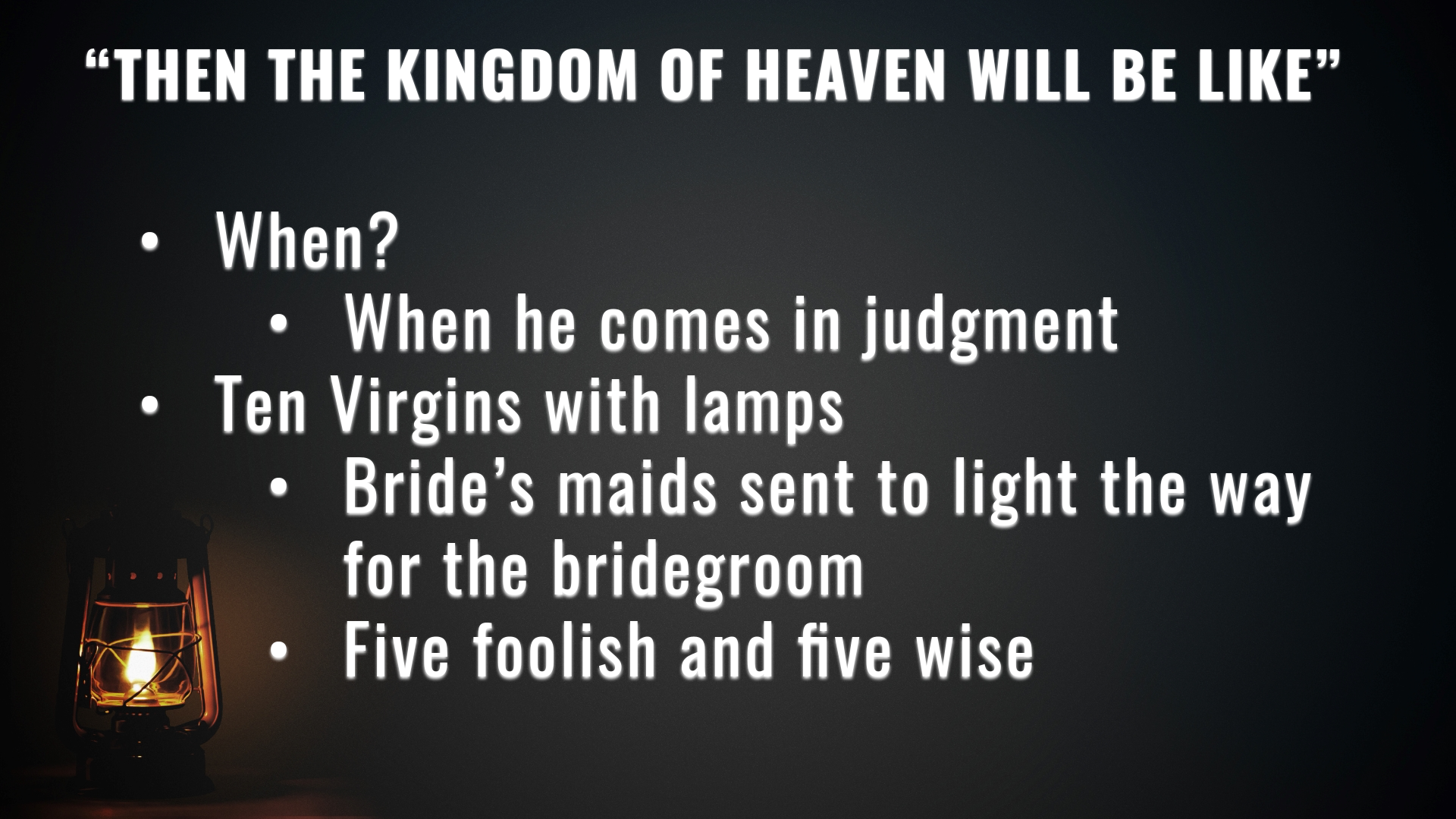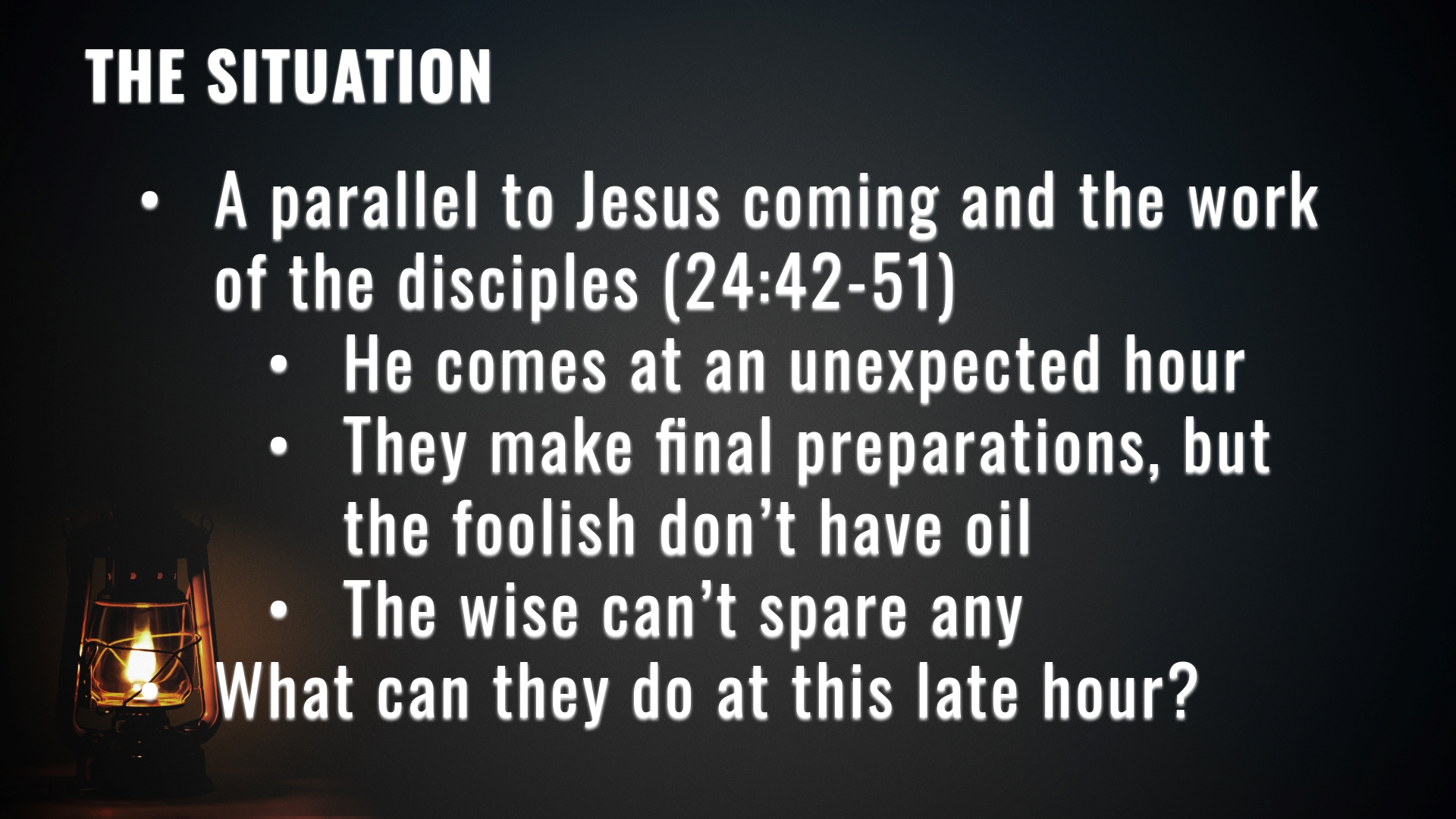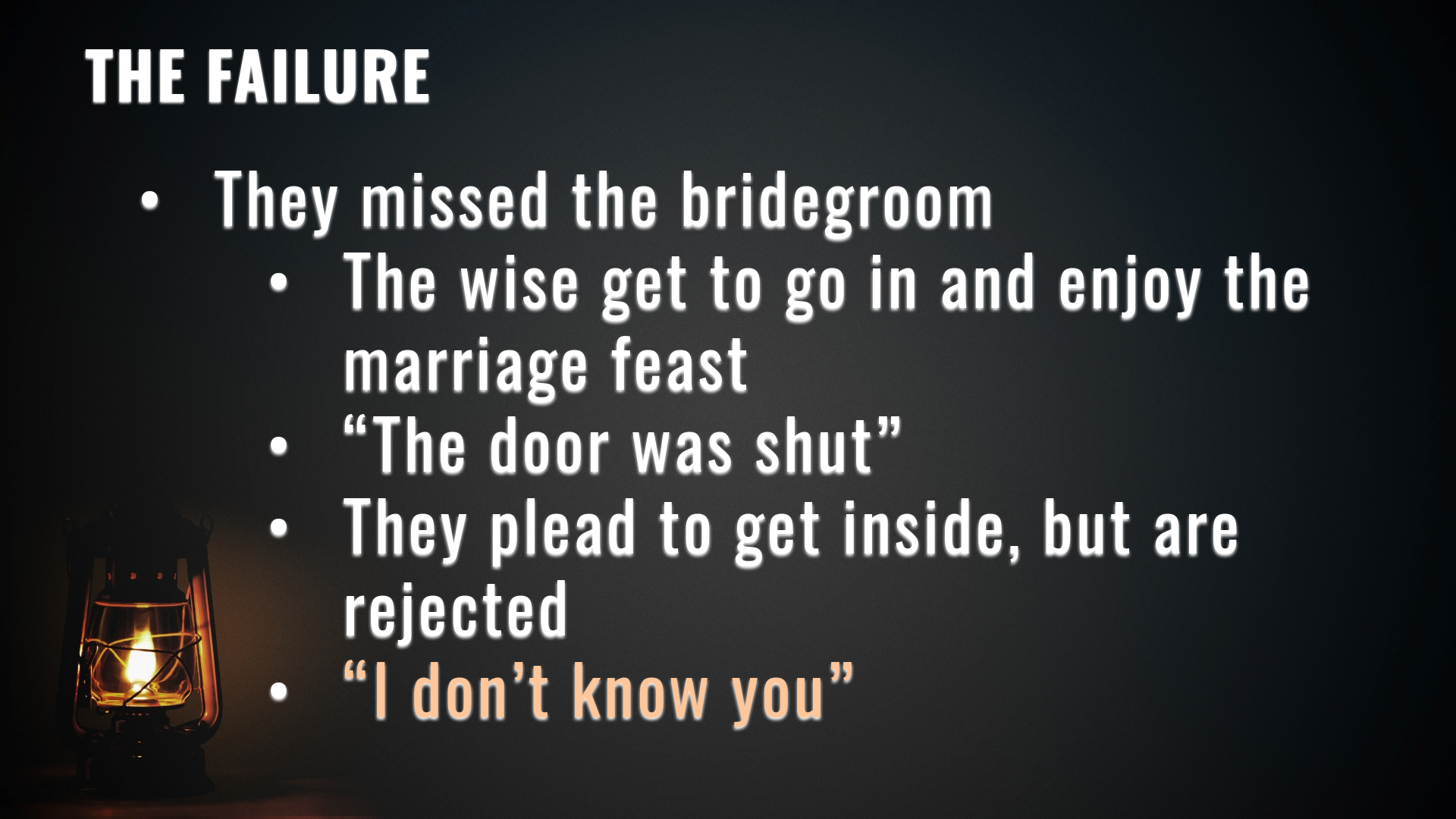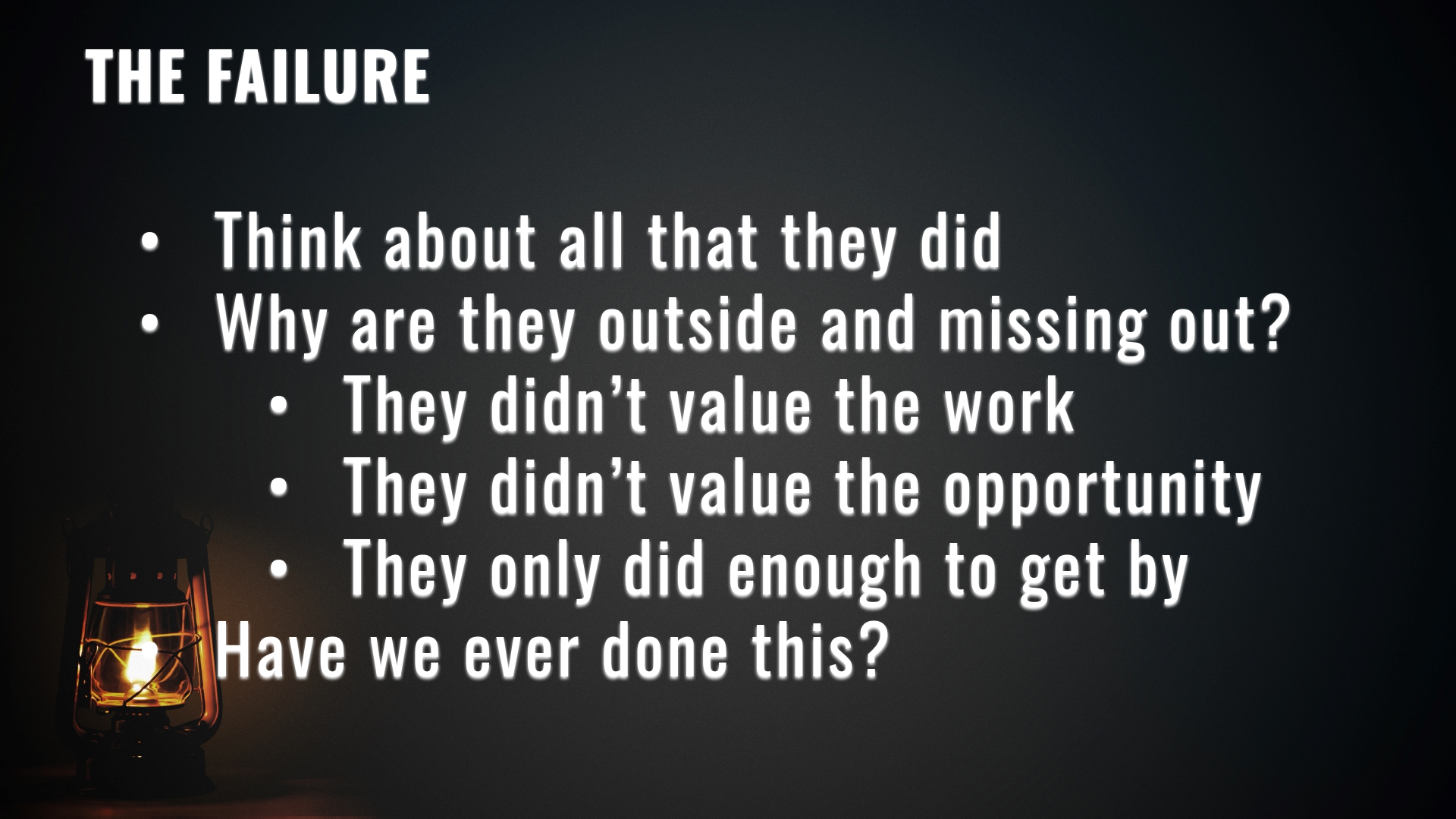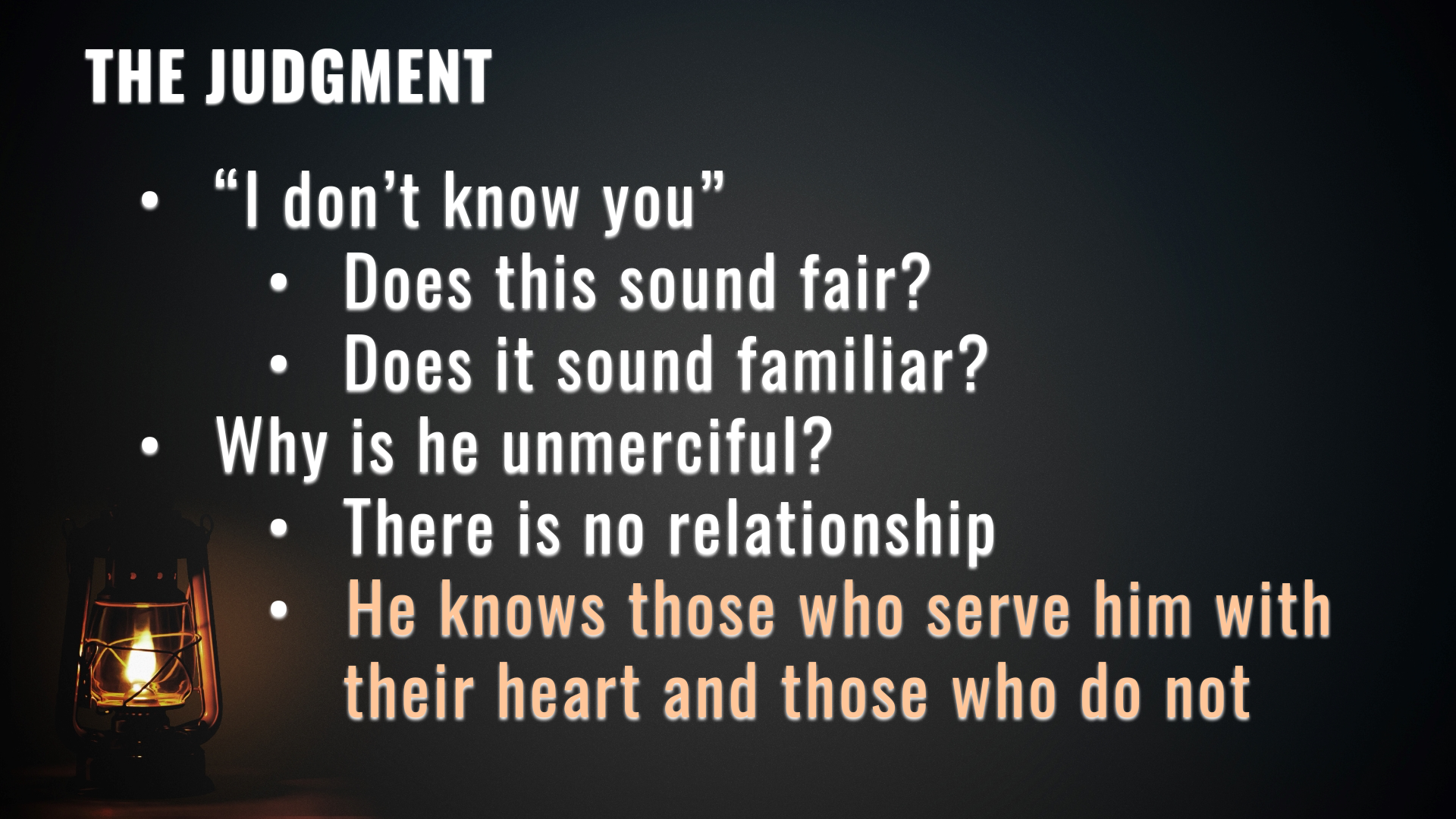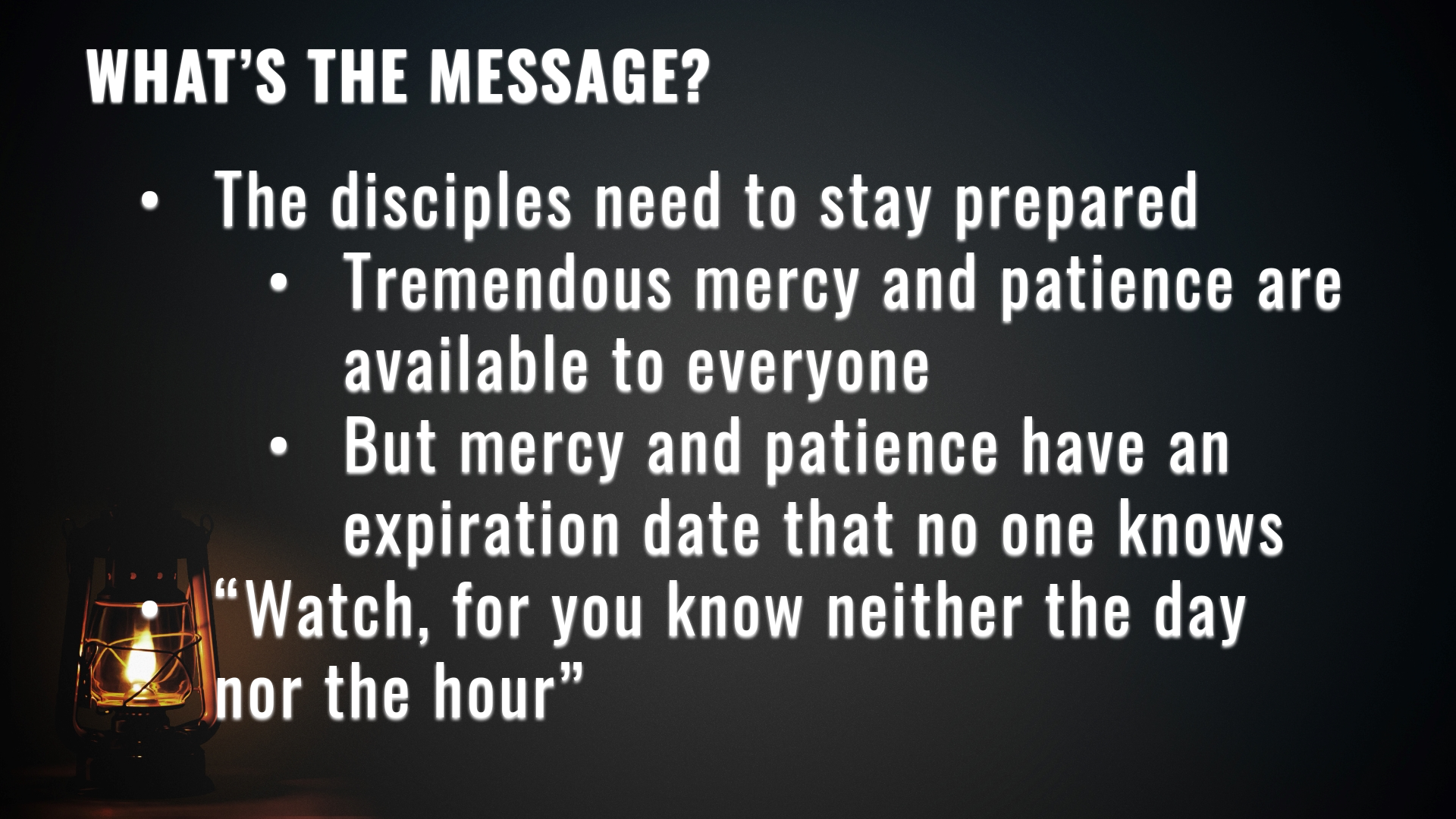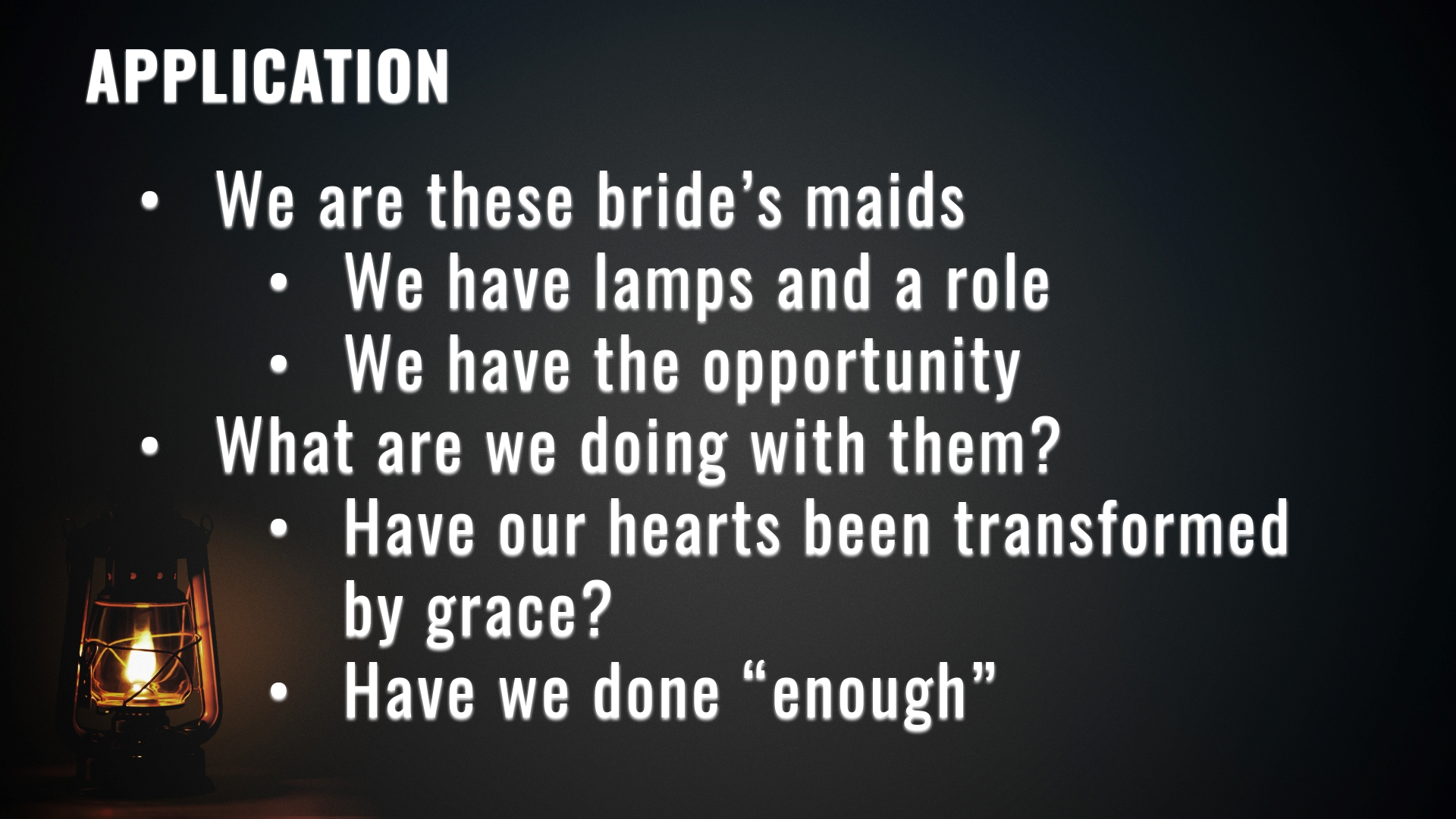The Midnight Cry (Matthew 25:1-13)
Chapter 24 and 25 go together. Jesus has not stopped talking, and this is not another speech. Jesus has been telling his disciples about the coming judgment against Jerusalem. They want to know when, but he gives them a general idea. He said that if they start to think that he's not coming in judgment and start living rebellious lives, he will come at a time they don't expect, cut them in pieces, and put them with the hypocrites. In case you are wondering, Jesus is not all rainbows and unicorns. He says, "In that place there will be weeping and gnashing of teeth. "They need to be "faithful and wise servants" who give God's household their food at the proper time.
In Chapter 25, Jesus gives two parables that keep encouraging his disciples to be faithful and wise servants. Then, he gives us a very clear picture of the final judgment. Today, we will look at the first parable.
Then the Kingdom of Heaven Will Be Like
Matthew 25:1--13 (ESV) --- 1 “Then the kingdom of heaven will be like ten virgins who took their lamps and went to meet the bridegroom. 2 Five of them were foolish, and five were wise. 3 For when the foolish took their lamps, they took no oil with them, 4 but the wise took flasks of oil with their lamps. 5 As the bridegroom was delayed, they all became drowsy and slept. 6 But at midnight there was a cry, ‘Here is the bridegroom! Come out to meet him.’ 7 Then all those virgins rose and trimmed their lamps. 8 And the foolish said to the wise, ‘Give us some of your oil, for our lamps are going out.’ 9 But the wise answered, saying, ‘Since there will not be enough for us and for you, go rather to the dealers and buy for yourselves.’ 10 And while they were going to buy, the bridegroom came, and those who were ready went in with him to the marriage feast, and the door was shut. 11 Afterward the other virgins came also, saying, ‘Lord, lord, open to us.’ 12 But he answered, ‘Truly, I say to you, I do not know you.’ 13 Watch therefore, for you know neither the day nor the hour.
The words of verse 1 are common. Jesus has been telling his disciples about the kingdom of heaven throughout the book of Matthew. But now, his parables tell them about the last days before he comes in judgment. When Jesus is about to return, the servants waiting for him will be like one of these ten virgins.
The Virgins
In verses 1-4, we have a description of the virgins. We can assume that these virgins are not going to be brides. It is more likely that they are the bride's maids. These young women carry their lamps (the word torch also makes sense) to meet the bridegroom and bring him in for the marriage feast. They have seen the sign of the bridegroom's coming, but they don't know the exact hour, and they have the job of lighting the way for him.
We are told that "five of them were foolish, and five were wise." Then, we are told why they were foolish or wise. The foolish took no oil with them, but the wise took a flask of oil with them. In those days, there was no electricity. But the equivalent would be to say that they didn't bring any additional batteries for their LED lantern. But the wise took extra batteries with them. The oil would provide fuel for the flame to burn.
The Situation
In verses 5-9, Jesus describes their situation, which parallels with the situation those waiting for Jesus to come in judgment will be in. He says that the bridegroom was delayed. This is very similar to the picture of the master being delayed in Chapter 24. But in this case, we are told that the bridegroom came at midnight. They were all woken up with a cry, "Here is the bridegroom! Come out to meet him." Can you imagine hearing that while you are in the middle of sleeping?
It tells us that all of them trimmed their lamps. Trimming a lamp would make the flame clear and bright. If you let the wick stay long, it would cause the light to be smokey and dim. But the foolish virgins recognized that their lights would run out before they could get the bridegroom to his house.
So they want the wise to give them some of their oil. But the wise virgins know that they would not have enough. They needed their oil to light the way for the bridegroom. The wise tell the foolish to go to the retailers and get some more oil. The bridegroom wasn't there just yet. Maybe they could get some and make it back in time. But if we stop to think about it, how likely is it that they would find some oil at this time of night. The shops are all closed up. It seems like they didn't have any oil at home. They only prepared with the mindset that the bridegroom would come in before this set amount of time. If they thought he would come in at midnight, they might have worked harder to have enough oil. But it was too late. They failed to calculate how much work they would need to do and how much oil they would need to acquire.
The Failure
In verses 10-11, he tells us about them failing to do what they were supposed to do, and it tells us about the consequences. While they were going to buy their oil, the bridegroom came, and those who were ready went in with him to the marriage feast. A marriage feast is a joyous event where families spare no expense to entertain their guests and provide for them. These wise virgins had a job to do, but they were able to enjoy the festivities after they did their job. But the end of verse 10 tells us that "the door was shut." That's not good. What about the foolish virgins who weren't ready?
Verse 11 tells us that they came and pleaded with the bridegroom. They said, "Lord, lord, open to us!" You can sense the emphatic pleading in their voice. Imagine being one of these women who have prepared themselves for this night to some extent. They had their wedding garments on, lamps and oil, went out to meet the bridegroom with the rest, and thought they had done enough. But they were foolish. Now they are outside the house while the feast is going on, pleading to be let in. After all they have done, their lack of preparation shows that they didn't truly value this opportunity. They had only done what they thought would be good enough.
This reminds me of other parables. In the vineyard parable, we saw how those who the owner hired at the last hour of the day were working as hard as they could because they didn't think they would make enough. These workers did not have that kind of attitude. They were doing just enough to get by. I'm scared to think about how this applies to us. Have we ever done the minimum? Have we ever, or are we continually doing just enough to get by. If you feel you have done enough, you're probably more like the foolish virgin than the wise. We should never feel like we've done enough, even if we have done more than anyone else.
The Judgment
The words of verse 12 are piercing. The bridegroom comes out and says, "Truly I say to you, I do not know you." These virgins will not be joining the bridegroom for the feast. "I don't know you" signifies that they don't know him, and he doesn't know them. There is no relationship. They were just random people hoping to enjoy a feast. The bridegroom knows those who serve him, but these have done nothing. We might look at that and say, "That's not fair!" But it's his wedding feast. He can open the door to whoever he wants, and he can close it on whoever he wants.
As I hear these words and see the result of this story, I am constantly reminded of school. Who here hasn't crammed for a test? I had that down to an art form. There were so many times when I saw other kids wait until the last minute to do their assignments. I was one of those kids. I remember telling my mom on the night before the science fair that I needed a poster board. I remember watching as some unfortunate soul would fail to complete in time. They would be begging and pleading for another chance or a little more time. Some teachers would fold, and some would hold their ground. But eventually, all the teachers would give the student another chance, even if that meant a considerable amount of additional work.
That's not what this bridegroom does. That's not what he's going to do. He will not open the door for those he does not know. They had one opportunity. They missed it, and they will have to live with that forever.
What's The Message?
So what do we learn from this parable? Jesus is giving his disciples a firm warning. There will be no second opportunity. Once Jesus comes, they are either ready or they aren't ready. Those who are unprepared will be shown no mercy.
Don't get the wrong impression. This doesn't mean that Jesus is unmerciful. But mercy is being shown right now. Jesus is merciful to men and women who will betray him and abandon him. He is offering them the opportunity they don't deserve. They can be a part of the wedding feast and serve the bridegroom! He is also warning them beforehand so that they will be entirely ready for his return. He wants to see them working and doing all they can with every day and every opportunity God gives them to shine their lights.
He closes out this parable, like most parables, with some words of instruction. The parable's point is for the disciples to understand that they don't know "the day or the hour," so they should always be ready. As he said in 24:43-44, Jesus is coming as a thief in the night. They need to watch for his coming! They need always to be ready for that day.
Application
When we think about applying this text to ourselves, we must understand that we are these virgins. We are invited to the marriage feast. Christ has mercifully offered us the chance of a lifetime, and we have accepted it. But this is no ordinary marriage feast. Jesus has given us a chance to join him and the Father for an eternal feast inside God's house.
Like these virgins, we are all given a role in the kingdom. All of us have a lamp to shine and prepare the way for the Lord's arrival. Maybe your lamp is teaching and preaching the gospel like the disciples. Maybe it's sitting beside the elderly and giving them comfort in their final days. Some of us have the lamp of encouraging the members no one pays any attention to. Some of us have the lamp of doing the minuscule tasks that no one wants to do. These are the most glorious works and roles in the kingdom.
The oil represents the zeal we put into our work. It represents our diligence and obedience to our master. He has allowed us to be in the house of God for all eternity, enjoying the wedding feast! How much do we value this opportunity? Are we wasting our days and just doing "enough." Are we content with how much work we have accomplished, or are we zealously working always to be ready? Or maybe a better question is, "Does he know my name?" If you love him and live to serve him, he knows you by name.
Please don't mistake what I'm saying. I'm not saying we have to do a certain amount of work to get into the feast. We are allowed into the feast by the blood of Christ. His grace gives us access. But our attitude and heart should be transformed by that tremendous grace. If we don't love much, we are failing to understand the tremendous weight of our sins. Jesus gives access to those who love God and love him. Zealous works, obedience, and righteousness come overflowing out of that kind of heart. If there is no transformation, the faith isn't genuine, and the grace will not continue to be available. Transformation is slow, but not too slow. It took me at least five years to see a significant transformation in my life. The biggest transformations are still going on.
If you are here and thinking, "I've not done enough," this parable is intended to get you ready. We need more oil. We need more love for Christ, more zeal to be in God's house, and more diligence to be prepared for his arrival. We should be saturating ourselves with his word and taking every opportunity to grow spiritually so we can glorify his name.
Now we wait for his arrival. Waiting and continually working will not be easy. Tonight we are going to talk about how Satan is working to pull us away from that work. Don't fall asleep spiritually. Stay awake, stay alert, and watch for him to come. We get one chance at this. If you miss out on this opportunity, you will spend eternity wishing you weren't the foolish virgin.
As I was listening to sermons on the ten virgins parable, I heard an interesting point. John Piper pointed out that the wise and foolish virgins were sleeping when the bridegroom came. Sleeping in this parable is not representative of being spiritually asleep (like we looked at last week). The foolish had been spiritually asleep, and that's what led to their lack of oil. Physical sleep is good, and we should get more of it, especially on Saturday nights, to prepare us to worship God. But I would say, get more rest in general. Get rest from whatever you tend to focus too much on. Set it down, pick up a Bible, pray, and get to work.
Conclusion
Are we willing and prepared to do the work that God has given us to do? Jesus tells us that those who aren't willing and prepared to put in the work do not know Christ, and he does not know them. If you don't know Christ or understand the amount of devotion and dedication that he calls you to, thank God you have not died before today or that Jesus has not come yet. He has been merciful to you by giving you more time to get serious, more time to fill your flask with obedience, passion, and love. Don't say that he's not coming tomorrow so that I can slack off today. That's being asleep in the Lord or having no oil in your lamp.

